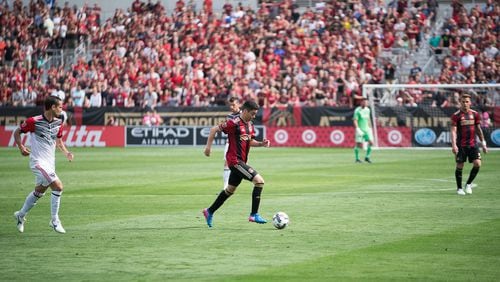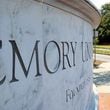Atlanta United, one of the fastest teams in MLS, has a home track to match. The expansion team speeds about Bobby Dodd Stadium on a surface that is pool-table flat and shaved close to the league-minimum length.
“I think it’s a really great field,” said midfielder Kevin Kratz, who has played the majority of his career on the manicured pitches of Germany. “They had to renew it before the Houston game, but because it was wet, it was very good. It was fast. Compared to German fields, there is nearly no difference.”
Its caretaker is Chris May, Georgia Tech’s chief groundskeeper, whose primary job is making sure that Tech football coach Paul Johnson and baseball coach Danny Hall have no complaints about their playing surfaces. In the past year, though, May and his staff have taken on the considerable challenge of babying Grant Field through a hectic football season and then keeping it green and healthy through spring practice and Atlanta United’s first three games at the stadium before tearing it up and putting down a new Bermuda grass carpet two weeks ago.
Among the successes of Atlanta United’s debut season — their Sunday home match against New York City FC will be their fifth consecutive home sellout, and their 24 goals lead the league — one of the less celebrated is the work that May and his staff have done to give Bobby Dodd Stadium’s tenants a near-flawless playing field.
“First class,” Argentine forward Hector Villalba said through an interpreter. “From the moment you walk into the locker room to the field, everything is top of the line.”
The effort has required a bit more than a weekly mow and paint job. May, a 33-year-old Lassiter High grad, has been planning the logistics of Atlanta United’s temporary residence for about a year. The implementation has required the all-in support of May’s four-person staff (not counting the two caretakers of Tech’s golf practice facility).
It has needed the skill, detail and passion of someone who said he has been on campus every day since Jan. 22, usually working 14-hour days.
“Chris May works his rear end off,” Hall said. “Just the challenge of our field, football, all the stuff going on in Bobby Dodd Stadium with Atlanta United. His plate has been more than full, but he’s just a tremendous grounds guy, no question.”
The planning for Atlanta United included a rye-grass overseeding during the football season because the Bermuda grass goes dormant in cool weather.
“Anything I could do to put lipstick on a pig,” May said.
Because the rye grass seeding was so heavy, it meant that the Bermuda grass couldn’t come back adequately in time for football, which necessitated a new field.
“Everybody keeps asking, ‘I can’t believe we tore the field out. It was great,’” May said. “I’m like, it was going to die in a month. It couldn’t have handled the heat.”
The installation itself was a feat. After peeling off about three inches of turf and dirt from the field’s sand base, May added about 330 tons of sand, which was tilled and graded. Then there were the shipments of sod — Latitude 36, a state-of the-art turf — that came in 30 deliveries on 18-wheeler flat-bed trucks May 15-16 from Precision Turf’s Braselton sod farm. Few Atlantans were as excited for I-85 to re-open as May and his staff.
“Believe me, there’s been a lot of heartburn, a lot of stress involved,” May said.
May has gone the extra mile, studying Atlanta United’s playing style to conclude that a faster surface would better suit the team. The grass is cut between a half-inch and five-eighths of an inch. The league mandates grass to be between a half-inch to 1 1/4 inches, and most are between three-quarters of an inch to an inch.
He has checked with players to make sure that the field has been watered enough — soccer players like the blades of grass wet so the ball slides across the turf. He typically gives the field a heavy watering early on game days to moisten the field for good footing, then sprinkles it right before pregame warmups, again when the team goes back to the locker room and one final time at halftime.
“I think just knowing that we’ve done all we can is satisfying,” May said. “We haven’t cut any corners on this.”
It has been all the more impressive considering that May was hired full-time to his position only last May, promoted to replace Jon DeWitt, who is now taking care of Nick Saban’s grass at Alabama. Further, the facilities department was undergoing considerable turnover.
But May’s staff has responded with long hours and taken few days off, handling the addition of Altanta United during the busiest time of the year, when baseball, softball, spring football and track are all competing for attention. They’re working, too, with the complexities of an urban campus with restricted space and an athletic department that doesn’t have money to burn. But the reward comes in compliments from world-class soccer players, congratulatory text messages from colleagues and the pride in showing off your handiwork to a sellout crowd.
“This has definitely been the worst grind I’ve ever been through as far as time and quality of life and whatever else that would go into it,” said May, who was married in January 2016. “But I think there’s a light at the end of the tunnel, and it’ll be worth it in the end.”
About the Author







